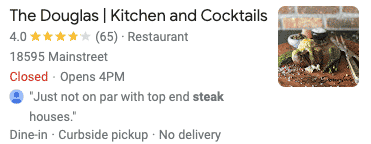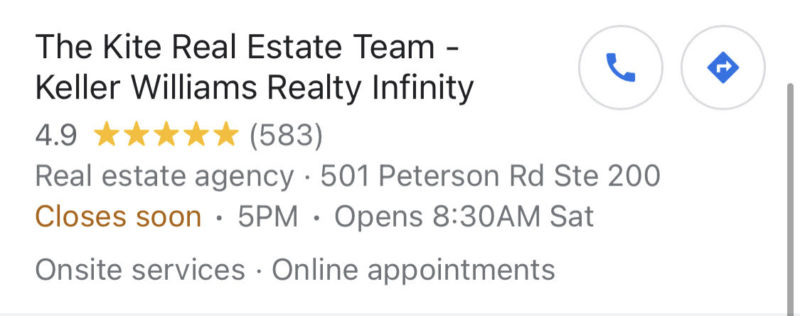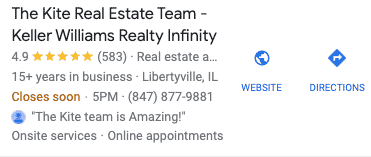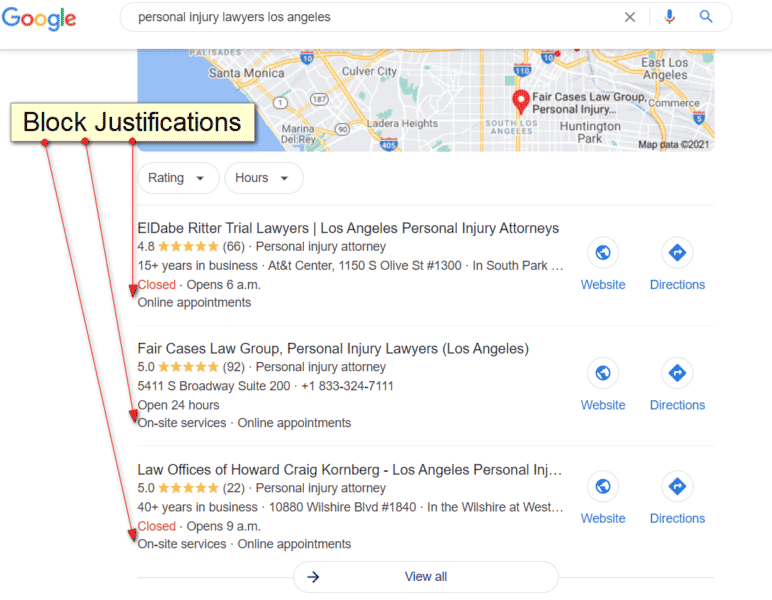Justifications are snippets of text that Google shows in the local pack to help users “justify” why the business is showing up for their search query.
There are a variety of types of justifications. The type you see highlighted in the local pack varies based on a user’s search query.
This guide will help you understand Google justifications.
Why Do Local Justifications Matter?
While they may not cause rankings, recent research from Moz shows that 57% of local packs feature justifications.
Some listings even show multiple justifications when a listing is expanded.
Types of Google justifications
website mentions
Pulled directly from content on your website, this type of justification will often show a user the page on your website where the content is being pulled from. It may include a meta description and photo.
Tip: Use these justifications to see what content on your site influenced the ranking for that search phrase, and use when working on strategy for other pages.
Review

Review justifications come from information within Google reviews for a business.
Review justifications can be influenced if reviewers use preferred keywords within their reviews.
Tip: Review justifications are not always positive. Actively managing Google reviews can help brands avoid embarrassing results.

in stock
If a business has activated See What’s in Store, or SWIS, function for their listing, in stock justifications may be displayed.
Tip: This is a third-party function. There are a few platforms that can help you get this feature enabled, like dbaPlatform.
Sold Here
Sold here justifications show a shopper that the product they’re searching for is available for sale at your location.
They’re identified by a checkmark in front of the justification. These justifications cannot be influenced.
provides
Like “sold here”, these service-based justifications use a checkmark icon in front of the justification. They pull from a brand’s Services in their Google Business Page.
Tip: Be careful about how you word your GBP services to avoid embarrassing results. For example, a plastic surgeon offering a broken nose does not seem very welcoming.
Menu

This is a justification for restaurants. Menu information is pulled from the restaurant’s menu within your Google Business Profile or the menu highlights, and menu items will display in the justification accordingly as a “menu highlight” or “on the menu”.
Tip: Keep your GBP menu information up to date – you never know when a midday craving will bring new business your way!
post
These justifications pull in keywords from your Google posts and have an exclamation point icon in front of the justification.
Post justifications are updated as new Google posts are published by your brand, but do not just look for exact-match, they also pull related keywords. They can overwrite other justifications and can be influenced by your brand’s Google post content.
Tip: If you’re trying to optimize for post justifications, keep posts to one main topic instead of listing a variety of products or services.
Justifications: What you need to know
Justifications update quickly
We have seen results update nearly in real time. Joy Hawkins has discovered justifications in search results based on an edit she had made barely minutes earlier.
This is great for correcting suggested edits, attributes that may be blocking justifications, or for changing information in your Google Business Profile.
If something isn’t working, review the above justification types and see if there’s something you can update in order to assist in triggering a new justification for a particular local result.
Justifications do not affect rankings
While website items featured in justifications may have a correlation to ranking, the justifications themselves do not.
If you see a result with a justification, that result was already ranking and now Google is adding more information to support the search result they’ve chosen to provide.
While many people believe that Google posts affect local rankings, testing has found that Google posts do not affect rankings.
Justifications are not a replacement or bandaid for a bad website or Google Business Profile.
Make sure that you’re providing relevant content for your business and your local area, strong onsite SEO, and are following other local SEO best practices.
Website justifications may be one possible exception to this rule.
When users see a “their website mentions” justification, this is likely an indication that Google finds this content to be reputable and relevant to the search query, and is likely relevant to the business ranking for that particular query.
Some justifications can be affected by user-generated content
Obviously, review justifications display content or information provided by users. However, Sold Here justifications do as well.
Google gets information on available inventory from Know this place? push notifications from Google Maps by asking users to answer questions about a local business after a recent visit.
At this time, we have not discovered a way to determine which questions Google will ask a user, only that Google pushes the questions after they’ve determined that a user has recently physically visited the business location.
Devices can cause variations in justifications displayed
Different device and display types will show different justifications.
A desktop result may show a justification when mobile does not, or mobile may show a review when desktop shows menu options.


Why doesn’t your brand show justifications in local search?
Be careful when setting up your Business Profile.
Both “online services” and “online appointment” attributes within a brand’s Google Business Profile will block justifications from showing in the local pack.
Typically, justifications will start showing up within approximately 48 hours of removing the attributes.

Share valuable information with justifications
Justifications are a fantastic way for brands to help share valuable information in the search results.
Map pack real estate is valuable. Take advantage of the potential of Google justifications.
Maximizing your efforts can pay off big.
Opinions expressed in this article are those of the guest author and not necessarily Search Engine Land. Staff authors are listed here.
New on Search Engine Land
.
Follow us on Facebook | Twitter | YouTube
WPAP (907)



